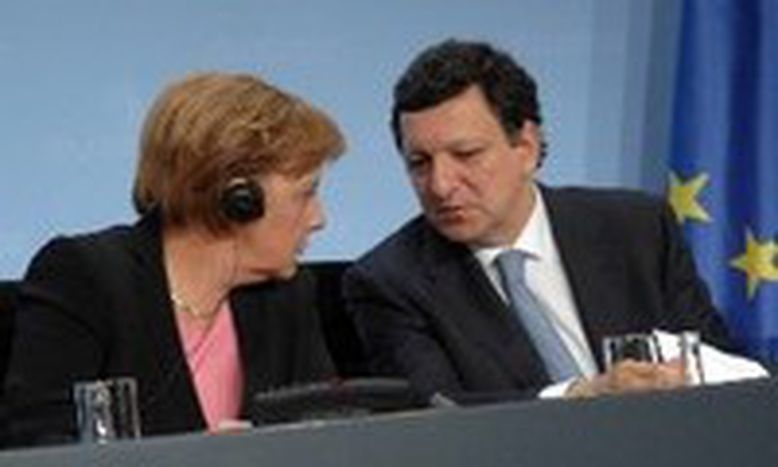
Last chance saloon: mini-treaty, or mini-Europe
Published on
Translation by:
 claire mcbride
claire mcbride
The next EU Summit takes place in Brussels from 21 - 22 June - an opportunity for German Chancellor Angela Merkel to encourage members to reconsider the idea of an EU constitution
2005 was a bad year for the European Union. Two members of the European construction – France and The Netherlands – said ‘No’ to a future constitution, which plunged the EU into an identity crisis which never before had existed. The integration process and promised reforms went on ice. A period of ‘thinking time’ was ordered.
Two years later Angela Merkel, current president of the European Union, wants to reignite talks on the constitution. On the eve of the summit in Brussels, which takes place on 21 - 22 June, there are still divides between member states. However certain terms and conditions are still agreed. There is hope of some compromise before the 2009 European elections, which last took place during Austria’s presidency of the European Council in the first six months of 2006.
France is the black sheep and ringleader of this commotion, without its ever actually having made a decision. Newly-elected French president Nicolas Sarkozy suggests a simplified treaty. It contains the rules for the running of the institutions without having a Fundamental Rights Charter, which could serve as a basis for discussion. Meanwhile, every member state has individually answered a letter from Angela Merkel, asking for pre-summit preparations to begin from a different discussion point.
Efforts appear to be worth it, but in practice the central question remains - can Angela Merkel, described as diplomatically-skilled, really get the other member states to agree on the constitution? Will France be in a position to adopt and implement another treaty whilst respecting the primary wishes of the French people? Will the Euro-sceptics agree with those members who sign the treaty?
Return towards Europe
On the eve of the election, Sarkozy maintains that Europe once again has a central place in French politics. ‘This evening France has turned back towards Europe,’ he announced as part of his victory speech on 6 May. Sarkozy also praised his European partners for ‘listening to the voices of the people who want to be protected’.
However, the question must be asked whether these rallying cries will be enough to convince the French. France’s voice in Europe has weakened significantly, even if Sarkozy’s simplified treaty brings them some success.
However, German tendency for further federalism is already an agreed basis for discussion. Spanish prime minister José Luís Rodríguez Zapatero believes that a 'more simplified, shorter treaty is possible.’ Again, this is under the condition that it contains several specific points - reform of the European parliament, a stable EU presidency (instead of the current six month rotation presidencies), and the creation of an office for EU foreign ministers.
‘At first I found it hard to agree with Sarkozy’s suggestions which meant a mini-treaty or a mini-Europe - it seems to express a minimalist approach,' says José Ignacio Torreblanca, a researcher at a private foundation called the Elcano Royal Institute in Madrid. But he appears optimistic. 'However, it has eventually become clear to me that we have the same ideas, especially when it comes to the relevance of the European institutions and a common European energy and economic policy’.
Convincing the Euro-sceptics
The real challenge facing the Chancellor is actually quite different. She has to convince critical and stubborn countries like Great Britain, Poland and the Czech Republic to come to a compromise, and to get them to understand that ‘only the institutions and reforms within the EU can solve the problems facing the different countries’. These Euro-sceptic countries believe that ‘the constitution offers more disadvantages than advantages,' according to Torreblanca. 'They question the constitution as well as the Treaty of Nice.'
The debate about the constitution has brought a prolonged wave of scepticism which has spread to other countries who were not sceptical before. It has also brought the weakness of the legitimacy of Europe's officials to the forefront. The wording of the constitution is very important for the political cohesion of the 27 current EU countries. Can the countries who cannot be convinced really just be left out of the constitution?
The main problem is the risk of a Europe in two halves progressing at different speeds. In Torreblanca's opinion, a ‘flexible’ commitment is possible so that countries can distance themselves from points they don’t agree with, without damaging the cohesion and togetherness of the member states.
In the German press review magazine Pearl-Diver, philosopher Jürgen Habermas calls the governments or ‘the heads of the constitution to recognise the possibility they have for power, and to establish democracy. It is up to them to lead a fight either for or against the constitution before the elections – all within the scope of a European campaign and the voting parties. If the referendum is a success, Europe can say goodbye to the train model which, until now, has set the tone within the EU.'
Follow cafebabel.com Brussels, who are blogging the event live
Translated from Mini-traité ou mini-Europe ?


